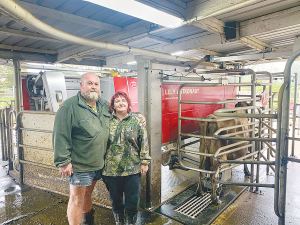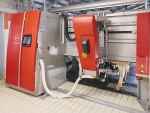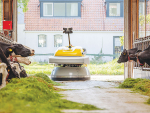Ian & Carmen Comins, Kihikihi, set up their farming operation in 2018, starting with 80 cows and working on increasing to 110, saw many attractive benefits to putting in robots, starting with just one robot they put another in 2020.
Now looking to the future with their business and a focus on sustainability as they set their goal to reduce the amount of antibiotics used with a goal of decreasing overall bulk SCC.
They researched a company called AHV (Animal Health Vision) – which is an innovative animal health company. Working in partnership with AHV they are seeing huge benefits by reducing their penicillin use.
They liked the idea of strengthening an animal’s immune system rather than treating with penicillin right away.
They are developing a more natural approach to their herd’s health and focussing on why a cow is run down and therefore getting mastitis.
They believe it is better for the health of the cow, and the milk they supply, to have this approach.
During the last few years, the Comins have learnt to manually separate the cows with higher SCC, and with the right course of action, have seen positive changes within a couple of days. This has led them to better understand what can cause their SCC to change.
They can do this with help from the Lely management platform system to identify those cows that show the first indication of infection and have been monitoring the progress of the cows treated with the AHV products.
Comins have used the use of technology to help provide valuable information such as:
- Report # 10 - Health report
This report combines available sensors on the farm to identify the cows that need attention on first response. These health attentions give the Comins insight into the animal number, group, lactation, days production, sick chance, and sensor reason like – milk temp / SCC indication / activity, value and severity.
- Another example is Report # 23 Milking Udder Health Analyse
The Udder health report provides information of attention cows with suspected udder health problems. This list combines milk sensor information, (milk yield, conductivity, colour and optional cell count). These are just two of the reports that assist the Comins in identifying the animals that need their care and attention.


















